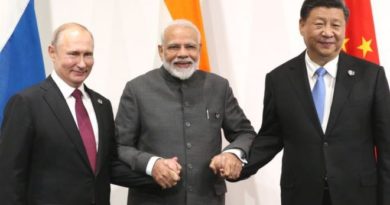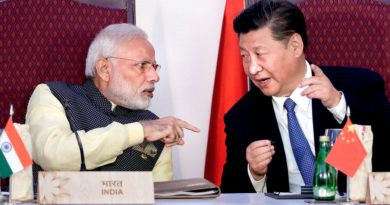Pegasus Spy: Country of Traitors!
Who is standing on which side in the Pegasus espionage case, it is not known, but from this it has come to know that traitors are sitting in every corner of the country. If there is no government then there is someone who is engaged in doing all the work of the traitors with the help of foreign powers. But if someone is able to do this without the knowledge of the government, then the danger is that he will do all the work for the country. We have produced more traitors in just seven years than the British could not find in more than two hundred years. Now there is a doubt whether there are more patriots or anti-nationals in this country. The matter arises in the mind that the government from which the society abdicates, it changes it, so what should the society from which the government abdicate? The direct answer is that the government should also change its society. Just as the people elect the new government, the government should also elect the new people.
The same question of sedition is troubling our Supreme Court as well. The government is that structure made by the people, which if a lot is for five years. We have fixed his constitutional obligation to do his work in such a way that the faith of the sovereign people remains and continues to grow. Then we imagined the judiciary. That is because whenever and wherever the government starts to consider itself sovereign, the judiciary should stand as an umpire. He should see that every game of democracy should be done by rules. We gave him the constitution for the rules of the game. But in this role she has failed. In front of him on many occasions the rules of the game were changed in such a way that the game itself kept changing. Democracy was to be made, it became Tantralok!
Our Chief Justice N.V. Raman has raised the question that what is the justification for the continuation of section 124A of the Indian Penal Code even after 70 years of independence? In 1870, this section was introduced in the Indian Penal Code by the colonial power which was neither Indian nor democratic. But that happened when we had neither freedom, nor democracy, nor constitution. Even when we had all this, the judiciary did not play the role of umpire, but started playing for the team in power. In 1962, the question of the legality of 124A came before the court. Then the court did not look at its background, nor did it tighten it on the test of democratic legality, but ruled that this section would be used only against a person who would be guilty of inciting social discontent. How little do the judges know of the ground reality! ‘Provoking social discontent’ is such a phrase, under the guise of which it is easy to implicate or implicate someone.
Emergency is a time for the judiciary. The manner in which the court ruled in the Habeas Corpus case of 1976 that the state could encroach upon the right to life of the citizens was not only an insult to the Constitution, but also an extreme of statutory cowardice. The NSA-like law that throttles civil rights was passed in 1980, soon after the second independence in 1977. In 1994, power went a step further and TADA came. Armed Forces Special Powers Act was enacted in 1996 and POTA in 2004. This paved the way for the UAPA to reach the neck of the citizens. All these laws tell a shameful story of the cowardly character of the power and the ostrich of the judiciary.
Gandhiji, while outlining the character of the judiciary, had said that whenever the hour came to directly fight the state’s malpractices, the judiciary would stand by the forces of the status quo. Then we understood that Gandhiji was talking about foreign judiciary whereas he was talking about all the structures seeking power and favor of power. There is a deep and fundamental difference between sedition and sedition. Mahatma Gandhi had openly declared that he was a staunch enemy of the Raj as he could not see the nation turning into a dying cowardly mob.
The greatest fear of power comes from dissent. See the irony that democracy survives on the oxygen of dissent, while dissent for power becomes carbon gas. Attorney General K.K. Venugopal is saying exactly what the government and the judiciary have said in the court while giving birth to every law that has crippled civil rights – use it with care! It’s a bit like putting a knife in a child’s hand and slip it on – drive carefully! The child can cut off his neck from it; Some power always bites the neck of a citizen who disagrees with him. This history is a proven geographical reality. Then how can the judiciary be so innocent as to allow the hand of the power to be the biggest knife?
Justice D.Y. Chandrachud says that whenever, wherever the majoritarian mentality is seen raising its head, then only it should be dealt with. “Not to do so would be a betrayal of the sacred concept of the constitutional republic that our forefathers accepted India into.” It is easy because the sovereign people of the Constitution will stand by him in every such endeavor. We know that one has to stand on one’s own feet, then the shadow also comes to support you.



